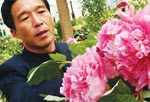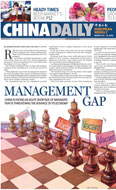Asia
PM: Japan on 'maximum alert' over nuke crisis
Updated: 2011-03-29 16:09
(Agencies)
TOKYO -- Japan's leader insisted Tuesday that the country was on "maximum alert" to bring its nuclear crisis under control, but the spread of radiation raised concerns about the ability of experts to stabilize the crippled reactor complex.
Wan but resolute, Prime Minister Naoto Kan told parliament that Japan was grappling with its worst problems since World War II.
"This quake, tsunami and the nuclear accident are the biggest crises for Japan" in decades, Kan said, dressed in one of the blue work jackets that have become ubiquitous among bureaucrats since the tsunami. He said the crises remained unpredictable, but added: "From now on, we will continue to handle it in a state of maximum alert."
The magnitude-9.0 offshore earthquake on March 11 triggered a tsunami that slammed minutes later into Japan's northeast, wiping out towns and knocking out power and backup systems at the coastal Fukushima Dai-ichi nuclear power plant.
Against the backdrop of the humanitarian disaster, the drama at the power plant has continued to develop, with workers fighting fires, explosions, radiation scares and miscalculations in the frantic bid to prevent a complete meltdown.
The plant has been leaking radiation that has made its way into vegetables, raw milk and tap water as far as Tokyo. Residents within 12 miles (20 kilometers) of the plant were ordered to leave and some nations banned the imports of food products from the Fukushima region.
Highly toxic plutonium was the latest contaminant found seeping into the soil outside the plant, Tokyo Electric Power Co. said.
Safety officials said the amounts did not pose a risk to humans, but they said the finding supports suspicions that dangerously radioactive water is leaking from damaged nuclear fuel rods.
"The situation is very grave," Chief Cabinet Secretary Yukio Edano told reporters Tuesday. "We are doing our utmost to contain the damage."
A series of missteps and accidents, meanwhile, have raised questions about the handling of the disaster, with the government revealing growing frustration with TEPCO.
The Yomiuri daily newspaper reported that the government was considering temporarily nationalizing the troubled nuclear plant operator, but Edano and TEPCO officials denied holding any such discussions.
Kan, meanwhile, faced stinging criticism from opposition lawmakers over the handling of a nuclear disaster stretching into a third week.
"We cannot let you handle the crisis," lawmaker Yosuke Isozaki said in parliament. "We cannot let you be in charge of Japan's crisis management."
The urgent mission to stabilize the Fukushima plant has been fraught gerously radioactive for hundreds of thousands of years.
"If you inhale it, it's there and it stays there forever," said Alan Lockwood, a professor of Neurology and Nuclear Medicine at the University at Buffalo and a member of the board of directors of Physicians for Social Responsibility, an advocacy group.
E-paper

Rise and shine
The Chinese solar energy industry is heating up following recent setbacks in the nuclear sector
Bombs aim for regime change
CSI, with a twist
Literary path
Specials

Peony express
Growers of china's unofficial national flower are reaching out to europe for help

Tea-ing up
More turning to Chinese tea for investment opportunities like vintage wine

A cut above
The ancient city of Luoyang is home to a treasure trove of cultural wonders.




